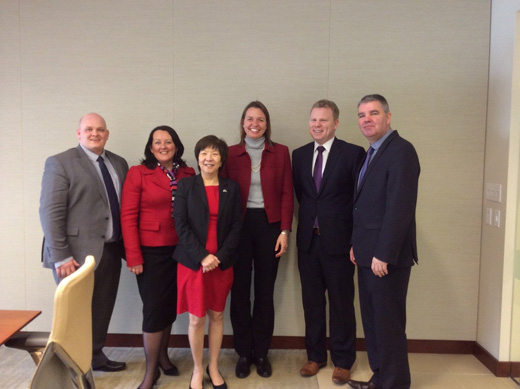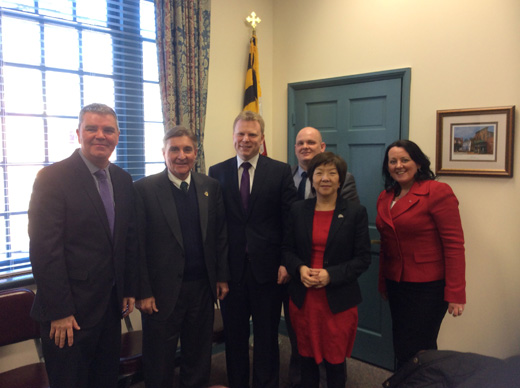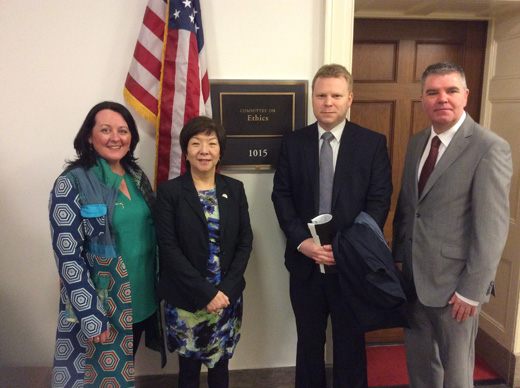Committee on Standards and Privileges: Visit to Washington D.C and Annapolis, Maryland
1. As part of its Review of the Code of Conduct, the Committee on Standards and Privileges (the Committee) visited Washington D.C. and Annapolis, Maryland, on 13th and 14th March 2014. Five of the eleven Committee members were present, along with the Clerk of Standards. Details of the meetings held are set out below.
Meeting with Kate Sawyer Keane of Perkins Coie LLP

2. On 13th March 2014 the Committee met Kate Sawyer Keane, a partner at the legal firm of Perkins Coie LLP. Ms Keane’s areas of expertise include federal and state campaign finance law, Congressional and Executive Branch ethics regulation, and lobbying registration and disclosure. She numbers among her clients members of Congress, federal officials, political parties, trade associations, political action committees, and other political organisations.
3. Ms Keane briefed the Committee on the elaborate system of rules regulating the activity of lobbyists in the United States. She focussed on the Honest Leadership and Open Government Act (HLOGA) of 2007, which refined thresholds for, and definitions of, lobbying activities; increased the frequency of reporting obligations for registered lobbyists and lobbying firms; imposed additional responsibilities to make disclosures and new semi-annual reports on contributions; and added coalitions and associations to the list of regulated entities. The Act provides for the mandatory electronic filing of lobbyist reports (examples of which were provided to the delegation); established a fully searchable, sortable and downloadable electronic disclosure database on the Internet; requires that campaign fundraising by lobbyists be disclosed to the public and posted on the internet; and prohibits gifts from, and travel sponsored by, lobbyists and lobbying organizations for lawmakers.
4. Ms Keane answered questions from the Committee about the definition of a lobbyist (various tests apply); the impact of the HLOGA on the lobbying industry; and the oversight and regulation of donations to elected representatives as compared with donations made to election campaigns.
Meeting with Delegate Brian McHale, Chair of the Joint Committee on Legislative Ethics

5. On 13th March 2014 the Committee met Delegate Brian McHale, House Chair of the Joint Committee on Legislative Ethics at the General Assembly of Maryland. Delegate McHale was accompanied by Ms Dea Daly, Counsel to the Joint Committee on Legislative Ethics. The focus of the meeting with Delegate McHale and Ms Daly was the General Assembly of Maryland’s Ethics Guide 2014.
6. Delegate McHale outlined key sections from the General Assembly of Maryland’s Ethics Guide 2014. These include provisions for managing conflicts of interest, a duty to publicly disclose interests, and strict rules concerning the receipt of gifts.
7. A Member of the General Assembly is disqualified from participating in any way in a legislative matter if his personal interest (or that of a relative or associate) conflicts with the public interest and thereby actually compromises his impartiality and independence of judgment. However, this disqualification may be suspended at the initiative of the Member by filing a disclaimer of conflict form with the Ethics Committee, declaring that he is able to vote on the matter fairly, objectively, and in the public interest.
8. Delegate McHale briefed the delegation on a recent report on the conduct of Delegate William “Tony” McConkey. Delegate McConkey was a licenced real estate salesperson who was found to have drafted, offered, lobbied and voted for amendments to a Bill which would have led to a direct personal financial benefit to the value of thousands of dollars.
9. Ms Daly explained to the Committee how, as Ethics Counsel, she is responsible for advising Delegates on the application of the Ethics Law. Each Delegate is required by law to meet individually with her at least once a year. The relationship between the Ethics Counsel and Delegate is one of attorney and client, and all communications are confidential unless the Delegate chooses to make them public. If a complaint is filed against a Delegate, the Ethics Counsel may not participate in the investigation or in any activities of a prosecutorial nature. The Ethics Counsel can provide advice about any aspect of the Ethics Law and can assist in preparing a request for a formal opinion of the Joint Ethics Committee.
10. Delegate McHale and Ms Daly answered questions on the distinction between a Delegate’s public and private life, interactions with lobbyists, leaks of confidential information, and managing conflicts of interest.
11. Delegate McHale also indicated that under no circumstances would the Joint Committee on Legislative Ethics entertain complaints about Delegates’ remarks or about conduct unbecoming a Delegate.
12. The Committee was provided with copies of the General Assembly of Maryland’s Ethics Guide 2014 and the report on Delegate McConkey.
Meeting with Representative Mike Conaway, Chair of the House Ethics Committee

13. On 14th March 2014 the Committee met Representative Mike Conaway, Chair of the House Committee on Ethics at Congress. Chairman Conaway was accompanied by Ms Carol Dixon, Director of Advice and Education for the House Committee on Ethics.
14. Chairman Conaway pointed out that ethical standards at the House of Representatives are regulated by three documents: the Code of Official Conduct, the House Ethics Manual, and the Highlights of the House Ethics Rules. The Code of Official Conduct is relatively short, consisting of eighteen high-level rules. The House Ethics Manual is much more substantial, at almost 450 pages. It describes the role and operation of the House Ethics Committee and what elected members, officers and staff of the House of Representatives must do to comply with their obligations under the Code. The Highlights of the House Ethics Rules condenses the most important provisions from the Manual into thirteen pages (one page each for thirteen different topics). Copies of each of these documents were provided to the delegation.
15. Some provisions of the Code of Official Conduct differ significantly from their equivalents in the Northern Ireland Assembly Code of Conduct. The House Gift Rule prohibits the acceptance of anything having monetary value unless permitted by one of the exceptions stated in the rule. Exceptions include gifts from family but not gifts from other Members. Gifts from friends with a value of over $250 can only be accepted with the permission of the Ethics Committee. A gift with a value under $50 is exempt as long as the donor is not a registered lobbyist, foreign agent, or entity that retains or employs them.
16. Strict rules also apply to the acceptance of hospitality and sponsored travel. Members and staff are only permitted to attend certain types of free events at which hospitality will be dispensed. A Member travelling on official business but at the expense of a private source must get approval in advance and in writing from the Ethics Committee.
17. The following are all prohibited:
- honoraria for speeches;
- paid professional services involving a fiduciary relationship, including law, real estate or insurance sales, financial services, or consulting or advising;
- compensation for affiliation with any firm that provides such professional services;
- use of the Representative’s name by any firm that provides such professional services;
- paid service as officer or board member of any organization;
- paid teaching (without the advance written approval of the Ethics Committee); and
- advances on copyright royalties in book contracts (royalties may be accepted only if the contract is with an established publisher on customary terms and with the approval of the Ethics Committee).
18. Chairman Conaway and Ms Dixon answered questions on allegations about Representatives’ comments, conduct unbecoming, the line between a Representative’s public and private life, interactions with lobbyists, leaks of confidential information, and other acts impeding the business of the legislature.
19. It was explained that the House Committee on Ethics would not consider complaints about Representatives’ comments and that a complaint alleging conduct unbecoming would only be considered where it fell within the scope of the House Ethics Manual.
Meeting with Tonia Smith, Senate Select Committee on Ethics
20. On 14th March 2014 the Committee met Tonia Smith, Counsel and Director of Education and Training at the Senate Select Committee on Ethics.
21. Ms Smith explained that the Select Committee on Ethics investigates complaints against elected members, officers, and employees of the Senate. A complaint must relate to the behaviour of the respondent in his official capacity and may fall under one of a number of categories. It may consist of an allegation of improper conduct which reflects upon the House, of a breach of the law, of the Senate Code of Official Conduct, or of other rules and regulations of the Senate. The Select Committee on Ethics establishes the facts, finds the respondent in breach or not in breach of the Code, and may recommend disciplinary action. It may also propose new rules or regulations to ensure that the appropriate standards of conduct are maintained.
22. Ms Smith noted that, like the House of Representatives, the Senate has a Code of Official Conduct (63 pages), as well as a complementary Senate Ethics Manual. The lengthier Senate Ethics Manual (550 pages) functions as a single source of information about ethics related provisions of the U. S. Constitution, federal statutes, and Senate rules. The Committee also produces a summary document entitled ‘An Overview of the Senate Code of Conduct and Related Laws’. This 20 page document extracts the key requirements from the Senate Ethics Manual. Copies of each of these documents were provided to the Committee.
23. Many of the obligations imposed by the Senate Ethics Manual are similar or identical to those found within the House Ethics Manual. Senators and staff may not accept any gift, even those clearly unrelated to official business, unless permitted by one of the exceptions in the rule. Senators, like Representatives, must also obtain prior written approval before undertaking privately sponsored travel, and are subject to restrictions on accepting travel expenses from private entities that retain or employ lobbyists or foreign agents. While Senators and their staff may practice a profession during off hours, they must not affiliate with an outside business to provide professional services for compensation; permit their name to be used by an outside business providing professional services for compensation; or practice a profession for compensation to any extent during regular office hours in the employing Senate office.
24. Despite the pervasive similarities, there are important procedural and other differences between the House Ethics Committee and the Senate Ethics Committee. For instance, while the House Ethics Committee takes referrals from the Office of Congressional Ethics (see below for further detail), there is no equivalent body at the Senate. The Senate Ethics Committee carries out its own investigations.
25. Ms Smith answered questions on allegations about Senators’ comments, conduct unbecoming, the line between a Senator’s public and private life, interactions with lobbyists, and leaks of confidential information.
Meeting with the Office of Congressional Ethics

26. The Committee’s final meeting was with Omar Ashmawy, Staff Director and Chief Counsel, and Bryson B. Morgan, Investigative Counsel, at the Office of Congressional Ethics (OCE). The OCE is an independent, non-partisan entity charged with reviewing allegations of misconduct against Members, officers, and staff of the United States House of Representatives.
27. Mr Ashmawy gave a presentation, a copy of which has since been provided to each member of the Committee.
28. Mr Ashmawy explained that the OCE is governed by an eight person Board of Directors. Members of the OCE Board are private citizens and cannot serve as members of Congress or work for the federal government. The Speaker of the House and the Minority Leader each appoint three members and an alternate and must consent to one another's appointments. Two Board members (one appointed by the Speaker and one appointed by the Minority Leader) may authorise a preliminary review of a complaint if the evidence amounts to a reasonable basis for concluding that a violation has occurred.
29. After the preliminary review stage, the evidence is again submitted to the Board. For the review to proceed to the second phase, three members must find that there is “probable cause” that a violation occurred. At the end of a second phase review, the Board must either recommend to the Committee on Ethics that the allegation warrants a further review or dismiss it. In all but one set of circumstances, the report and findings of the OCE Board must be published.
30. Mr Ashmawy answered questions about the OCE’s relationship with the House Ethics Committee and how differences of opinions are managed; the media pressure to make public statements on the subject and progress of its investigations; the difficulty in establishing the source of leaks; and how they deal with complaints which fall outside their remit.
31. Mr Ashmawy expressed the view that the House’s Code of Official Conduct and Ethics Manual were open to improvement and recommended that the Committee also consult the Canadian Conflict of Interest Code for Members of the House of Commons during its review.



